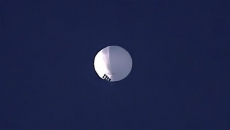At least 19 million doses of COVID-19 vaccines are set to expire by the end of the year in Canada, according to data received by The Canadian Press.
The federal central inventory currently has 18.5 million doses in stock, with 16.8 million of those bearing 2023 expiry dates, the Public Health Agency of Canada said.
There are more than eight million additional doses in provincial and territorial stockpiles, according to data provided by ministries and departments of health across the country.
Those numbers show more than two million of the provincial and territorial doses will expire by the end of the year.
However, that's likely an underestimate because Ontario, New Brunswick and P.E.I. did not disclose the proportion of their doses that would expire by year-end. Ontario alone has 4.8 million COVID-19 vaccine doses in its supply.
"The Government of Canada, along with provinces and territories, will continue efforts to optimize its COVID-19 vaccine supply management and further reduce COVID-19 vaccine surpluses and wastage," a spokesperson for the Public Health Agency of Canada said in an email.
Some of those doses, for example, could be used in COVID-19 vaccine campaigns if the National Advisory Committee on Immunization (NACI) recommends further booster shots "based on evolving scientific evidence."
Other potential options could include donating surplus COVID-19 vaccine doses to developing nations or extending the expiry date on some doses if they're still effective, the Public Health Agency of Canada said.
A fall booster shot campaign for the general population is "likely," said Dr. Matthew Miller, director of the DeGroote Institute for Infectious Disease Research at McMaster University.
NACI's current spring recommendations are targetedatmore vulnerable groups.They include booster shotsfor people age 65 and older, as well as others at high risk of severe illness, if it's been six months or more since their last shot or a COVID-19 infection.
About 6.7 million of the doses in the federal inventory are bivalent COVID-19 vaccines, which specifically target the Omicron variant and are recommended for booster shots. Data from the provinces and territories show that a large portion of their vaccine supplies are bivalent doses.
A supply of non-bivalent vaccines is still needed for people getting vaccinated for the first time (primary series of shots) and for children under five years of age, health officials across the country say. More than 80 per cent of Canadians have completed their primary series of COVID-19 vaccination.
Canada also "stands ready" to donate surplus COVID-19 doses to developing countries, Global Affairs Canada said in an email to The Canadian Press.
But it acknowledges that many lower-income countries either aren't asking for COVID-19 vaccines as much as they were earlier in the pandemic, or theydon't have the ability to get the shots into people's arms.
"The global landscape has shifted from a period of limited supply to one where vaccine supply currently exceeds demand and administration capacity," Global Affairs Canada said.
"The current challenge is therefore not supply, but delivery, distribution and demand in country."
Plus, the clock is ticking for donating doses as the expiry dates approach.
"Recipient countries typically request vaccines with at least six months of shelf life, which is considered to be a reasonable timeline that allows for planning rollout," said a spokesperson for GAVI, the global vaccine alliance that helps oversee COVID-19 vaccine donations, in an email.
So far, Canada has donated more than 25 million doses that have been shipped to 30 countries, the GAVI spokesperson said.
Another potential option to minimize vaccine wastage is expiry date extensions by vaccine manufacturers that are approved by Health Canada.
That has already happened in P.E.I., said Morgan Martin, a spokesperson for the province's Department of Health and Wellness.
"The vaccines in our current inventory have varying expiry dates, and are updated if and when the manufacturer is granted an extended expiry date," she said in an email.
"For example, the current Pfizer infant and Pfizer pediatric vaccine expiry dates were extended and now do not expire until 2024."
To determine if a vaccine is still effective beyond the original expiry date, manufacturers do "stability testing," said Mina Tadrous, an assistant professor of pharmacy at the University of Toronto.
"A manufacturer basically lets something age and then tests it in a certain environment," Tadrous said. Those tests take factors such as refrigeration into account when determining if there are circumstances where the expiry date can be extended.
Because COVID-19 vaccines were new products made in response to an urgent pandemic, there was no way to know how long they can actually last so they were given "really tight" expiry dates, he said.
As time passes, researchers can see how long and under what conditions vaccine and drug formulations last, Tadrous said — and expiry dates could be revised in consultation with Health Canada.
Despite efforts to use as much of the COVID-19 vaccine supply as possible before it expires, there's going to be waste, both Tadrous and Miller said.
But that's not surprising given the complexities of trying to protect people and predict vaccine uptake during a pandemic, they said.
"From a domestic standpoint, we would far rather have the problem of having too many vaccines than too few," Miller said.






